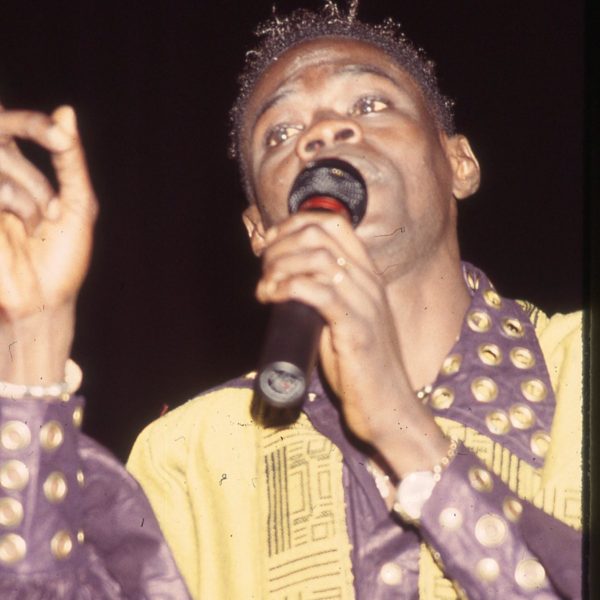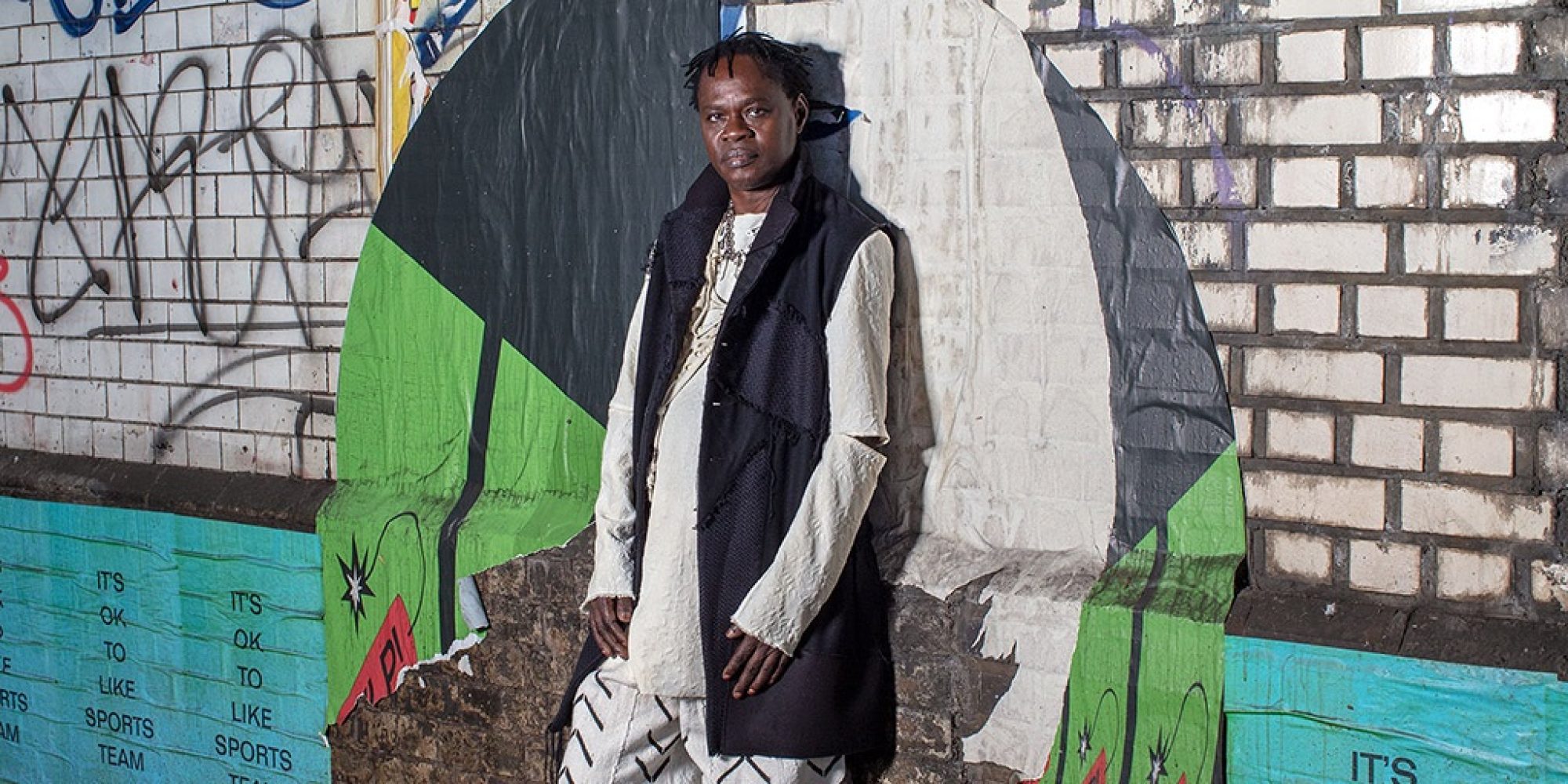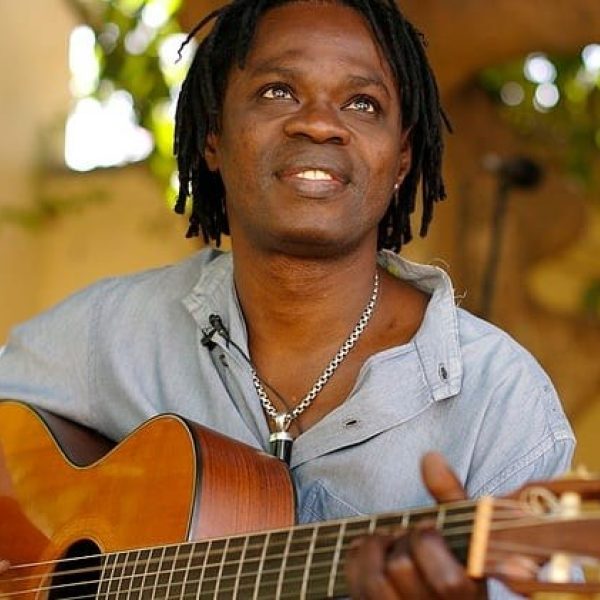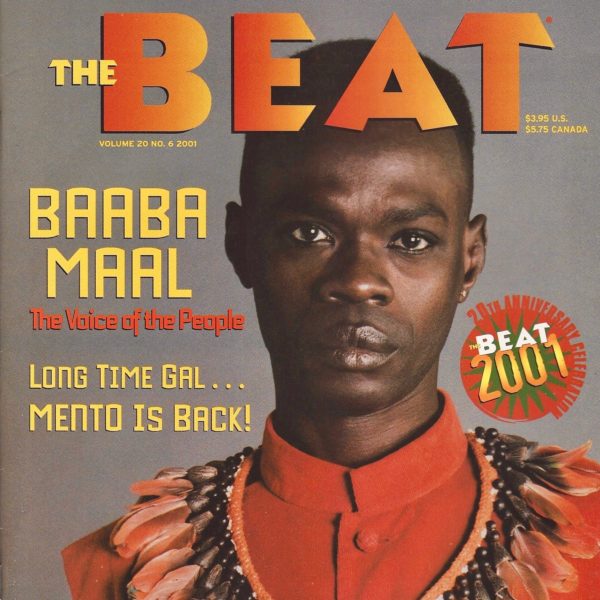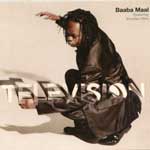Baaba Maal is an icon of African music. Alone with his lifelong friend and accompanist Mansour Seck, with his band Dande Lenol, or in any number of collaborations—including in the soundtrack to both Black Pantherfilms—he never fails to amaze with his otherworldly voice and brilliant songs. It’s been a long time since he made an album, and in fact, he told the world he was done with recording. Then, lo and behold, he arrives in 2023 with Being, a set of seven spare, beautiful songs that take us back to the basics of his inimitable sound, featuring percussion, traditional strings, and especially that extraordinary voice. Producer Johan Hugo of the group The Very Best was clearly a catalyst, but when I reached Baaba by Zoom in Senegal last week, he said that even as he worked with Johan, he was really just having fun, with no intention of releasing an album. Happily, he changed his mind. Here’s our conversation.
All photos of Baaba Maal by Matthew Donaldson.
Banning Eyre: Baaba, how great to speak with you again.
Baaba Maal: Do you know I am in this place on the way to Toubab Dialaw. We don't have fiber optic here. I was having difficulty getting a Zoom connection.
Well, I'm glad to see you made it.
I made it. I was struggling. But then it worked right away.
It's like magic isn't it? It either works or it doesn't. Do you see that I have your picture on the wall behind me?
I saw that. Just yesterday I was organizing some books upstairs and I saw the book there. I have two of them actually. One of them I'm supposed to take it to Podor. But it's here.
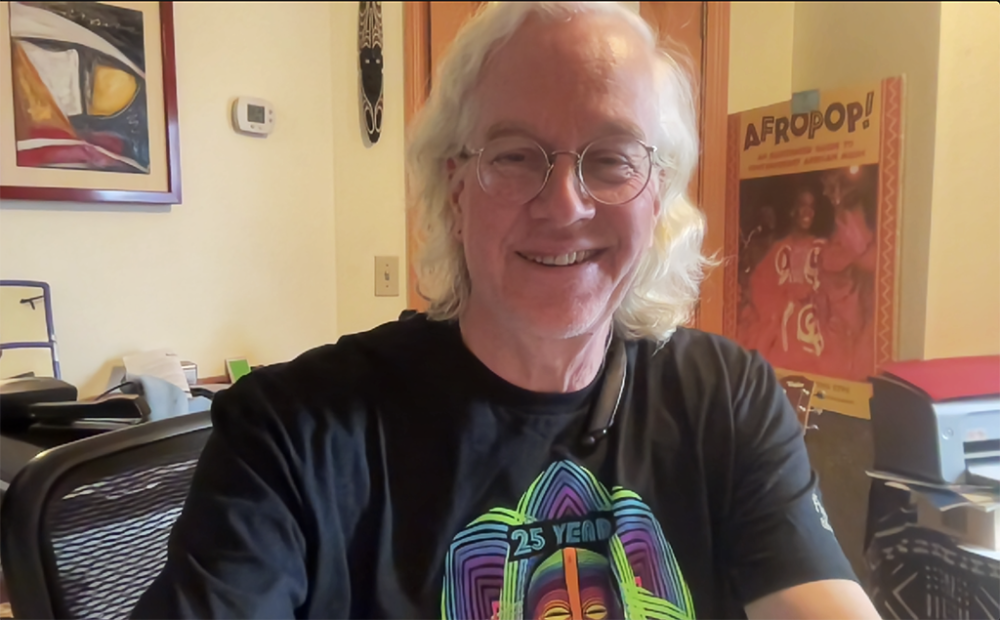
Well, hold onto it. They're collectors’ items at this point. It's amazing to see you. The last time I saw you was at that show at the Met in New York on March 3, 2020, right before everything closed down. I often think about that, because it was the last time I went to New York for almost a year. That was quite a moment.
Yes, I remember. How is everyone. How is Sean?
We're surviving. Sean sends his best. We were just in Tanzania. Our first time in Africa in years. We went to the Sauti Za Busara festival in Zanzibar and heard a lot of great Swahili music. It was wonderful. And Georges Collinet is hanging in there. The years haven't caught up with him yet.
Is he still fit and strong?
Yes, he is. He still delivering.
Very good. I'm glad to hear that.
So I've been listening to this album, Being. It's so interesting. It gets at sounds we haven't heard from you for quite a while. It’s spare. It's open. What was your idea for this album?
Being. Just being. It's just what it says. It's being, to come back in the old way of sitting around with friends, talking about things, but not forcing ourselves to write songs. Just pick up the instruments and play with some of the ideas, not to force anything, with no plan. Just let it be and let it go. I did feel that after also these years, it might be the right way to just be happy in your life and to write music also. Just to let things happen, not to kill yourself with, “I have to do this; I have to do that.” Just be. Everything will talk to you naturally and you will find solutions. You will find sentiments that you need for your life and to share with other people. Also to be with people you want to be sitting with and playing music with and talking about what's happening in the world. The lesson at the end of the day is if you come back to just being, and breathe, and look around and to be aware of what's happening around us, it will help us to feel O.K., even to feel good.
That sounds great to me.
This is why on the last song, “Cassamance Nights,” I didn't say I was going to do it in two minutes or three minutes. I just let it be. Let it flow. With all the sounds of the crickets and the water. There was no structure. We just let things go. In the end Johan went back into the studio to add some other things. But for me it was just like I used to do with Mansour. Just sit down and play and sing.
That track is almost nine minutes long, and it's beautiful.
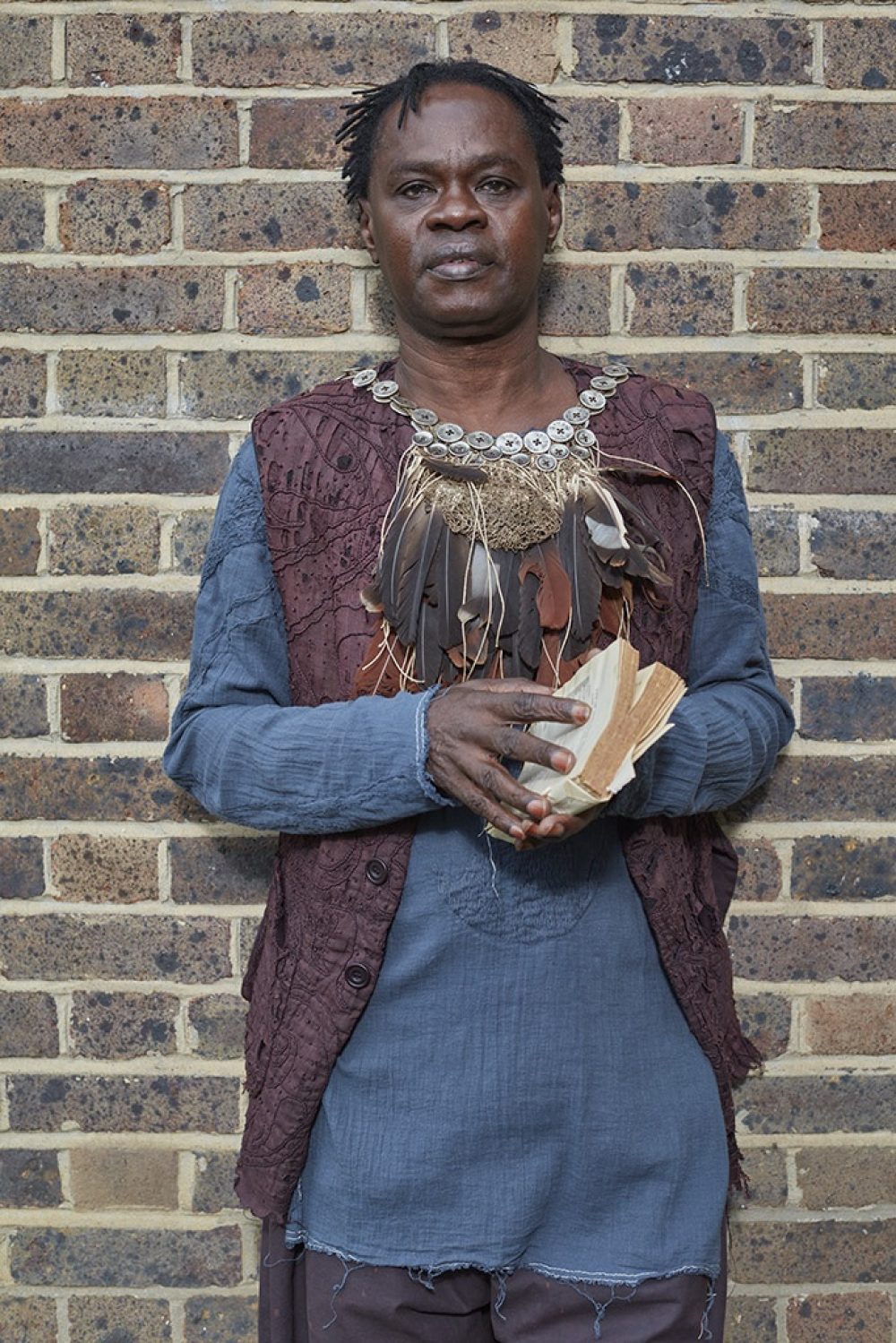
I gather that for a while before you made this album, you thought you were done making records. Maybe it was a reaction to that feeling of always having to do something new and work with new people. I imagine that was pressure. Is that right, that you had said at one point that you were done making records?
Yes. I was not planning to make records anymore. But I have this friend, this producer Johan, who came to Podor.
I’ve known Johan since the early days of The Very Best. He's a good man.
That's right. And he came with some ideas and we invited some friends, like the girl Rougi who is singing on the song “Boboyillo.” We just came up with some ideas on the roof and on the floor of my room in Podor. We had the microphone. We had a little computer. And we said to Rougi, “You are singing some of the songs of me, Baaba Maal, on social media, and I really like it. You're doing it in social media and and you're singing to all the Fulanis in France and Germany and the States. So do you want to try something?" She said yes. She was very brave. So we started to play songs like that with Demba Dia and Baru Sall on the ngoni. We said, can you play on this? She said yes, we can do it.
We passed two or three nights, plugging in the ngoni and letting them play and come up with ideas. And at that time, we didn't say we were going to make a record. We were just making songs together. We had time. We appreciated being together and we started to record these elements.
And then we came to New York where there was another project that we wanted to talk to people about. So we took the time to go to Pioneer Works and sit down in a small room. Momadou Sarr had two bottles he was hitting on the floor. And we had this computer again, and we started to record things. Little by little we ended up with… “Wow, how many songs do we have? Four? Five? Let's call it a record. Let's finish it and make it a record.” So I went back on my word saying that I'm done with recording. Maybe this is gonna be the last one. Maybe not. Now that I find another way of playing music, maybe it will be number one. Maybe there will be number two in some years. Who knows?
Time will tell.
Yes.
I hear that quality in this album. It feels very natural and relaxed. Let's talk about some of the songs, what you’re singing about. Let's start with the opening: ”Yeremayo Celebration.” What's that about?
”Yeremayo Celebration” is about the fishermen who have this big celebration that connects them to every town. People have these traditions in different communities, the fisherman communities on the Senegal River around Podor. Most of these traditions are disappearing, except the tradition of the fishermen because of this celebration. The celebration is something they do at the opening ceremony of the Blues of the River Festival, all this regatta, all the boats that we decorate and the fishermen are having this party and a competition on the river. So along the river you hear all the drumming and all the fishermen’s women will be dressed in their jewelry. They sing songs to praise their loved ones in the middle of the river. And we have this song called “Pekan,” which is just an a cappella that people sing, and we are praising the river or the spirit of the river.
And wherever these fisherman go, even the ones who are in France or in Spain or who are in America, they are connected to their families through the celebration. It's because of this celebration that they can participate. They can send money. They can tell their their opinions about what people should buy in the village. They can put up something for education or new projects. It's all connected by the celebration. So it's not just the joy of the celebration. It's the meaning of bringing the people together, even the ones who left and went away.
That is beautiful. I've seen pictures and video of your festival. Is it happening this year?
It's happening in December, Inch’allah.
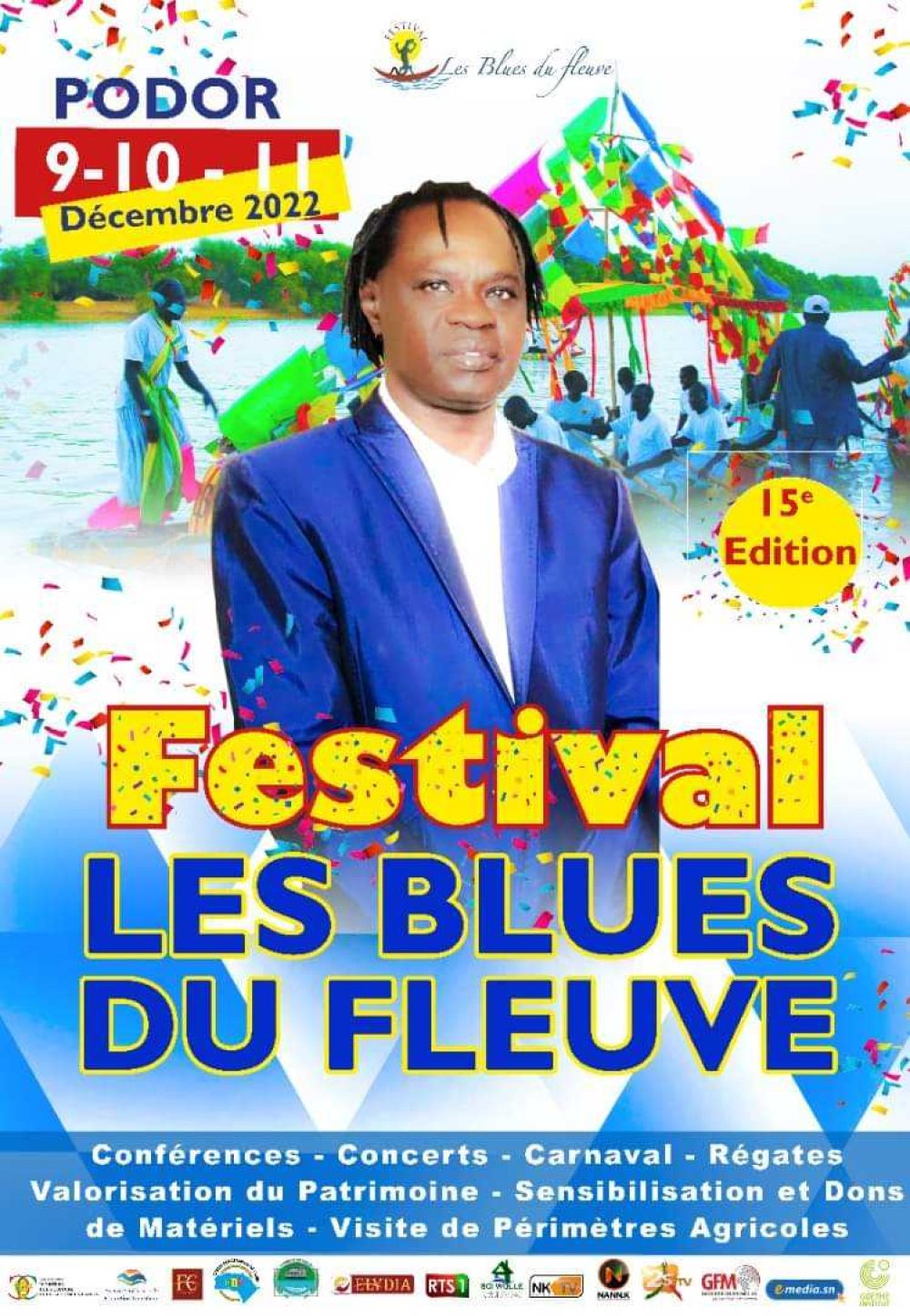
Well, I sure would love to go to that festival. How about the song where are you are featuring The Very Best. You have both Johan and Esau Mwamwana on the song ”Freak Out.”
”Freak out.” Yes, great. I love ”Freak Out.” I love this song because I'm talking about social media, and the fact that it has good effects in Africa, but also people have to be very careful with what we put in the social media. It's the easiest way to talk to people. It's connecting everyone. Everyone has an opportunity to say what they think, to present his views or sell his goods and put a price on them. Someone can be on the other side of the planet and say, “That's good. I want to buy it.” It's good for people who never get the chance to be connected to be part of this big market, this big village. You get to participate in the world now.
But at the same time, in the song I'm saying, “This is good, but you should be really careful of what you put in social media.” Sometimes we might forget that in Africa, especially in West Africa, the structures of family are so important. Some of the traditions don't allow someone just to say whatever they like. If you want to talk to your grandfather or your dad or your mother, and you just put it in the social media, you need to respect the other side, the privacy and the organization, the tradition of the family. When you're angry, you don’t need to just say, “I’m angry at my dad. I'm putting this in the social media.” This is not something you do in the tradition, because it might break the harmony of the family. So in the song I'm just saying, “In life, you have to know these things. Put the important things on social media, but also hide some things because they can destroy families.”
The one who puts everything in the social media can be the one who is destroying the society. The one who's hiding everything from social media can be someone who who can't help the society to move. So you have to be in the middle. Put on the good things. But you can easily put something that you will regret someday and it will destroy your family. We communicate in different ways to keep the harmony of the family. So use the social media, but don't forget that we have something more basic in the harmony of the family. That is something we have to keep.
Very wise. Social media is powerful, but also dangerous.
Very dangerous. At the end of the day no one knows what's true and what's a lie, what's the true story.
Let's go through more of the songs. How about “Ndungu Ruumi” ?
“Ndungu Ruumi” is dedicated to my hometown, Podor. It's talking about the population down there, about the movement of the population. That movement is still existing. When the rainy season comes, most people leave the little town of Podor and go up to the fields in the upper region and they stay there up to six months. And then when the rainy season is finished, they go back. People have to come back; it's the movement of people with the seasons.
But when I sing about that, I also sing about the environment and the protection of the environment, because by moving from the upper region to the lower region from year to year, most of the land is becoming degraded. Most of the vegetation, the trees that we used to know, the birds the varieties of vegetables, flowers, everything that makes it beautiful is going away. So it's a way to say it's beautiful to have this movement and to follow the seasons, but we have to tackle climate change. We have to protect the environment, and not to take lightly the impact of climate change. We need to do something to fix all the land and all the beauty that people have. It's beautiful to be living there, but the desert is coming to us. So “Ndungu Ruumi”, the two words mean “the rainy season is going away,” so let's move to something different. That's the meaning.
You can really feel climate change up there in Podor. You have seen and felt the desert moving, haven’t you?
Oh yes. And it's also here on the coast of Senegal. When you go to the coast of Senegal you see some of the cities like Rufisque, like Lampoul, like Saint-Louis, which is a beautiful city, you can really see the impact the level of the sea rising up. It's dangerous. It's really dangerous. It wipes out a lot of beauty in Africa.
Everywhere.
Everywhere, yes.
How about “Agreement.” I was just listening to the song before I called.
That song is very important for me. It's a proverb, but not my proverb. It's a Fulani proverb that says an agreement is sacred. If you know that in the future you will cut this agreement between you and the one you are agreeing with, to build something between yourselves, like me and Mansour Seck, then it should never have started. If ever you think one day you're going to break that, you should not have established an agreement. In the proverb we say, “Saying no the first time is better than to say yes and then later on you cut that agreement.” It can be between you and your friend, between you and your partner, between you and your family, between human beings and the planet. We agree to protect each other. One day we can't just stop protecting the planet, cutting the trees and doing this and that. You are cutting the agreement. It's really a sacred disagreement, and if you hear in the lyrics, I mention names. I mention Mbassou, who is my former manager who passed away.
I remember Mbassou. I'm sorry to hear that.
Mbassou didn't cut the agreement. It's only because he passed away. And Mansour Seck: he didn't cut the agreement. Massamba Diop [Baaba’s long time percussionist in Dande Lenol] did not cut the agreement. We are still here together. We are still friends. We're still playing music. So this is a good way after 40, 50 years to keep the agreement, even with all different things that surround us. We know that we agreed to be together, and we will stay together. Even if we don't have any force to play music, we will be friends forever.
That's beautiful. And Mansour? Is he well?
He's very well, very funny. He is still Mansour.
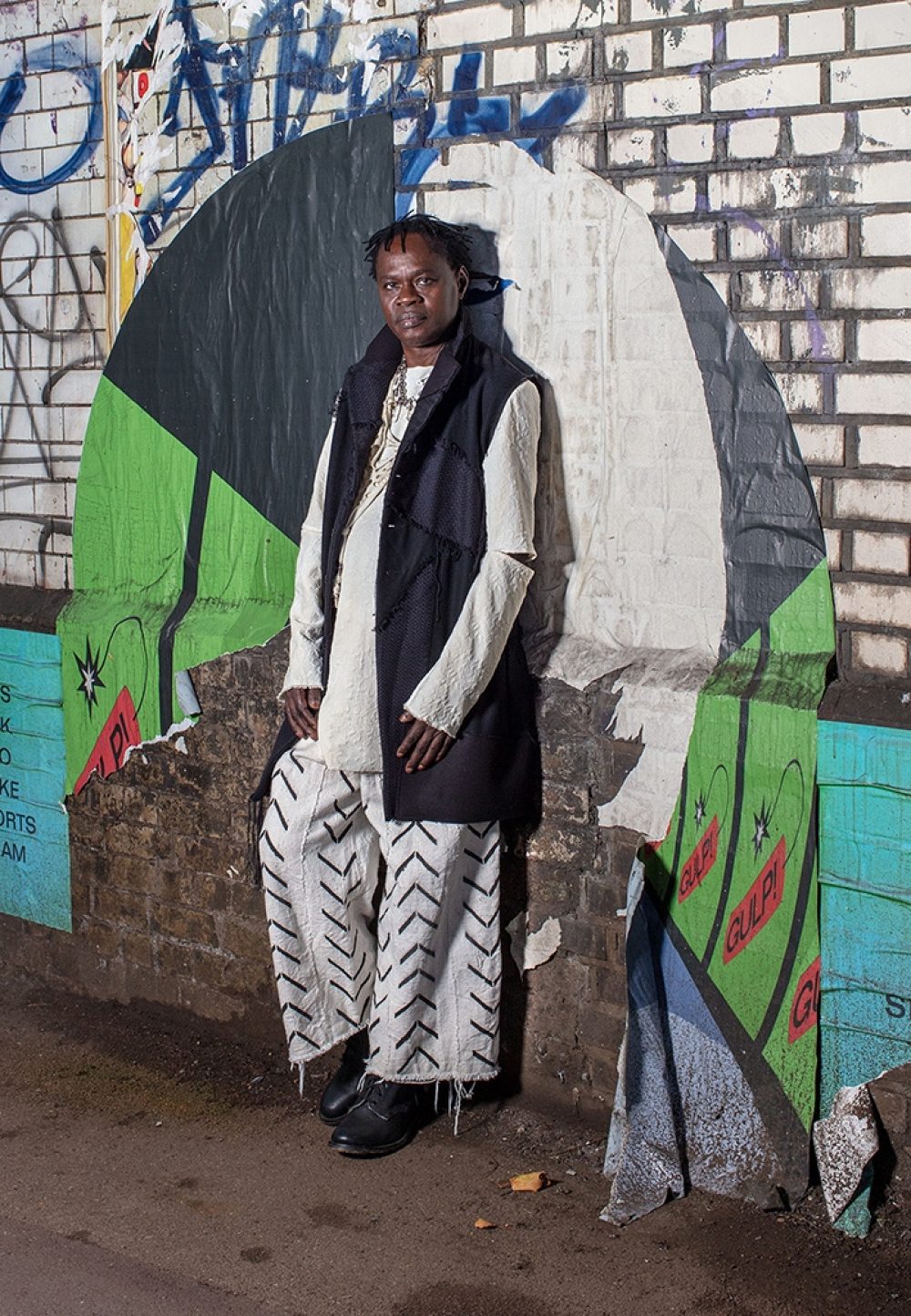
Well, send him our love. And we know Massamba is well because of his work in the Black Pantherfilms. It was really a thrill to watch the new film and hear your voice and that opening a funeral scene. So powerful. That must've been a great experience.
It really was. It was a surprising experience, such a different way of playing music. It's not the same as making a record or playing in the middle of a house party with friends. It's a different process. But you know, in life you still learn. And I'm so happy for Massamba. I'm sure that he's having a lot of good times. I saw some of the things that he's doing all the time with young kids at the schools, which is beautiful I think.
Where is he staying these days?
He is there in the States, in Ohio. But he came here not long ago. We did four or five, six shows, And then he went back after. But he's coming back soon. He is between Senegal and there.
Ohio, eh?
Yes that's where the Senegalese people are, in Ohio.
We had Wally Seck here last year and a big Senegalese crowd came, but they told me that the big show was going to be in Atlanta. So I guess there are a lot of Senegalese and Gambians there too.
Yes, a lot in Atlanta, but also in Columbus, Ohio, and Cincinnati.
Interesting. What about “Boboyillo,” the song with Rougi. Did you say her voice was recorded on your roof?
Yes, exactly. We didn't change anything in her voice.
It's a lovely voice, and it is rather similar to yours.
Yes, she's a good singer, a very good singer. And I really wanted to have her because she surprised me. One day people sent me a TikTok of a woman on a horse dressed in very traditional yellow clothes and with the Fulani hat I used to put on my head. And she was singing “Allah Addu Jam,” the song from Mi Yeewnii. And she was singing it perfectly. I didn't know her at that time, but at the end of the day I found out that she is my niece. She's from where my mother used to come from.
She lives in Podor?
She is in Mauritania now, in Noakchott, but she's from near Podor. She's very brave. She's very talented and she loves what she's doing. She has a family but she manages to balance it very well between family living as a mother and children, but at the same time doing the work she wants to do which is music.
That's fantastic. What is the song “Boboyillo” about?
The song is talking about her as a young person, and as a Black woman. She’s singing about all these young people who are forced to take a boat to go to Spain, or take the desert and go to Libya or Tunisia, and they don't know what will happen. Everyone knows what happened recently in Tunisia. She's talking about bobo yillo. Bobo means a young person, and yillo means to go on a journey, to go to find new opportunities. In the song she is saying, “Wherever you go, don't forget about your family. Don't forget about your community. Don't forget about your country. Don't forget about yourself, who you are. Don't change yourself so when you come back you will stay the same and you will be beautiful and you will connect with the ones you left behind.” That's what the song says.
There's just one more we haven’t talked about: “Mbeda Wella.”
“Mbeda Wella!” [Laughs] I love that song because it's just saying. “I’m pleased. I'm happy. I'm happy to sing this song. I'm pleased to dance this dance. If you're happy, just join me in this dance.” This is just to celebrate between people, but it's more between me and my crowd, between me and the people who come to see my concerts. Mbeda wella. We are pleased to have something together. We are pleased that Senegal and the world are dancing with me. If you are connected, everything can change into something really bright and beautiful. So it's just a connection between your people, your fans. “I am pleased to entertain you. Are you pleased to join me?” “Yes. We are pleased. So let's do it.” And in the middle of this song, I have this young person who is called Paco Lenol, “The General” he calls himself. And he's doing the rapping in Fula.
Well, I can tell you that a lot of people over here want to get in on that connection. Is there any plan for you to come and bring your show back to the States?
I'm looking for that. My team, my agent is working on that. I know that after this pandemic it's a little bit difficult to organize a lot of gigs, but we are looking for that. We're doing our best, because we know there are many fans who want to see this. And I myself want to go and perform these songs. We're playing on May 30th at the Barbican in London, and some other shows are coming along in England. We are starting to open up with agents and promoters to book the band. And it will be Dande Lenol with some guests. It will be something a little bit different but the people of Dance Lenol will be there on the stage.
You know, I have to tell you that during the pandemic I spent a lot of time alone with my guitar. I recently went into the studio started recording some of my own music, just instrumental music. But I’m being very relaxed about it, just the way you described.
This is exactly what I was doing. That's why Being is what it is. “O.K., this is the situation. What can I do? Pick up my instrument, sit down with friends. If I can't travel, we sit down and play things and record it. It's good for a song. It's nothing. We just have a good time.
Music keeps you young.
Yes.
I treasure the time we got to play together in New York. That was a beautiful experience.
Thank you.
Just before we go, I have to let you know that this is the 35th year of Afropop Worldwide. We're celebrating this year.
You know it's very bizarre. I was telling you that I saw the book behind you when I was in my reading room, when I was putting everything in order. I opened up where I put all my CDs and DVDs and I see these CDs of Afropop, just before Suzette called me to say you might be talking to Banning tomorrow. Just before that. I'm telling you. Everything has a meaning. Everything has a reason.
That's so nice. You've been one of our heroes since day one. A lot of people have come and gone in that time, and a lot of new artists have come on the scene, but it really means a lot to us to have a connection with you because it takes us right back to the beginning.
I think Afropop has done a lot of great things for music in general. I was there when African music was trying to find its way into the world, and also into the business. And it was really good support for musicians who were just taking a plane arriving in New York, and no one knows them, and the first people that they will meet and who will give us a lot of interest and make us say, “Yes! We can make it,” was the people of Afropop. And this is something that we can never forget. If today we can see all these young artists, Wally Seck and some others coming from Nigeria, we have to tell them that Afropop was there. This is why all the time I say this young generation should know that whatever they're seeing now, they have to remember that people have been here working from day one till now to make everything possible for African music.
Thank you very much for those kind words. And thank you for talking with me. We can't wait to see you again. We love you.
Love you. Love you.
Thank you.
Related Audio Programs
